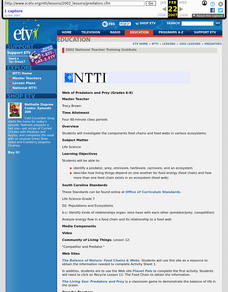Curated OER
Extra! Extra!
Students describe how plants and animals depend on each other. They see how living and nonliving environments change over time. They identify ways in which humans have changed their environment and the effects of those changes.
The Imagination Factory
Design a Postage Stamp for Black History Month
Learners create a postage stamp for Black History Month. In this U.S. History lesson, students discuss the contributions of African-Americans and design a postage stamp to celebrate their impact.
Curated OER
It's Goin' Down; The Rain Forest
Learners discover the global problem of deforestation. In this environmental lesson, students identify organizations on the quest to stop deforestation. Learners also discover what they can do to solve this global dilemma.
Curated OER
Protecting Our Planet
Learners examine the impact of pollution. In this pollution lesson, students watch Protecting Our Planet, then participate in a simulation of the effect of pollution on a variety of organisms.
Curated OER
Jitterbug
Students build a motorized toy. In this science fair project idea, students use everyday objects and an electric hobby motor to build a motorized toy that seems to dance.
Curated OER
Native Species Restoration and its Impact on Local Populations
Students explore how predators help control the growth of prey species for a more balanced ecosystem.
Curated OER
Ecology of the Dump
Students determine which types of garbage are biodegradable and which are nonbiodegradable. They practice measuring skills, hypothesizing, taking data, and writing a lab report. Students observe the relative biodegradability of metal,...
Curated OER
Scooting Along!
Students investigate how Newton's Third Law affects vehicle design. In this Newton's Third Law instructional activity, students use a web site to research Newton, his third law, and how to design a vehicle that uses a balloon for power....
Curated OER
Web of Predators and Prey
Students investigate the components food chains and food webs in various ecosystems. They describe how living things depend on one another for food energy (food chain) and how more than one food chain exists in an ecosystem
Curated OER
COMPOSTING: WHY BOTHER?
Students explore the composting process and participate in a contest to make the most compost the fastest from the school's kitchen and yard waste.
Curated OER
Solid Waste Takes Over
Students explore solid waste and its effects on the environment. They explain some of the major problems caused by waste disposal and the use of landfills. They suggest ways to reduce the amount of solid waste going into a landfill.
Curated OER
Flight Dreams - Flight Factors
Students investigate the physics of flight by experimenting in class. In this history of flight lesson, students define terms such as gravity, lift, and drag in order to better understand how a plane is able to stay in the air....
Curated OER
Conservation in Costa Rica
Students brainstorm what they do that requires land use and use a worksheet to calculate their footprint (the total area of land and water required to produce all the resources they consume). They then compare their footprints to each...
Curated OER
TESI 04 Lesson Plan
Students write and balance five chemcial equations which have been observed throughout the process of completing the experiment. They use vacuum filtration to recover suspeneded particals from a colloidal suspension. Students correctly...
Curated OER
Maracas
Students create Maracas out of various supplies while learning about percussion instruments in this Art and Music lesson for the elementary and middle level classroom. Detailed directions for two different methods are given.
Curated OER
Ecosystem Interactions in Refuges
Seventh graders, using national parks as models, illustrate the energy flow in ecosystems. Working in groups, they use murals, flow charts, or other visual displays to record their findings. Students represent the food chains and webs...
Curated OER
How Long Until Dirt
Third graders examine the difference between composting and wasting food. They problem-solve what to do about leftovers after lunches so good food doesn't go to waste.They study food storage techniques that are environmentally friendly...
Curated OER
Nerve Cell Informercials
Students research the structure and function of the nervous system. They prepare a model or representation of neural transmission. Students create an infomercial about nerve cells.
Curated OER
Bandhavgarh: The Tiger's Domain
Learners research Bandhavgarh, India in order to create a project that educates people about the area and the royal Bengal tigers that roam freely amongst the ruins of temples and palaces of the once powerful dynasty.
Curated OER
Making a Mini Worm Habitat
Students explore the process of converting organic waste into usable fertilizer. They observe how living and nonliving things interact with one another by making a mini-worm habitat.
Curated OER
Strategies for Success
Students share opinions about common bad habits, read about behavior economics by reading and discussing article "Your Plate Is Bigger Than Your Stomach," identify goals and strategies designed to improve negative behaviors, and test...
Curated OER
Those Amazing Earthworms- A Worm's World
Learners investigate earthworms. In this organisms lesson, students observe earthworms in their environment and record their behavior towards light and how they eat. Learners continue on a month long observation.
Curated OER
Microorganisms: Good Guys or Bad Guys?
Learners discover the role microorganisms play in our lives. In this decomposition lesson, students examine decaying foods and plants in order to analyze the different bacteria that grows. Learners discuss the good and bad of...
Curated OER
Hidden Animals
Students predict the safest seashore substrate for animals. In this animal habitat experiment, students predict, test their hypothesis, and record data about how wave shocks affect animals living on either sand, gravel or rock.

























